Engaging in after-school activities is a fantastic way for kids to explore their interests, develop new skills, and have fun outside of regular school hours.
These activities provide a valuable opportunity for children to socialize, stay active, and learn beyond the classroom.
We will introduce you to some of the best after school activities for Preschool kids that are both enjoyable and beneficial for their overall development.
Soccer:
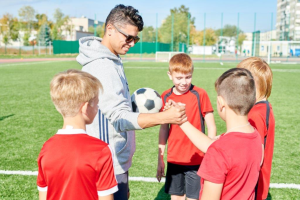
Soccer is a popular team sport that provides numerous benefits for kids. Joining a soccer team allows children to develop their physical fitness, coordination, and teamwork skills. They learn how to work together, communicate effectively, and strategize on the field. Soccer drills also promotes a sense of discipline and commitment as kids attend regular practices and games. Additionally, it offers opportunities for friendly competition and can boost self-confidence as children improve their skills and achieve personal goals. Whether they dream of becoming professional soccer players or simply enjoy the sport, soccer is a fantastic after-school activity for kids to stay active, make friends, and have fun.
Art Classes:
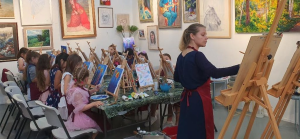
Art classes offer a creative outlet for kids to express themselves and explore their imagination. From painting and drawing to sculpting and mixed media, these classes introduce children to various art techniques and mediums. Engaging in art activities helps improve fine motor skills, hand-eye coordination, and spatial awareness. It encourages self-expression and boosts confidence as kids see their artistic creations come to life. Art activities also foster an appreciation for different forms of art and can inspire a lifelong passion for creativity. Whether your child is a budding artist or simply enjoys getting crafty, art classes provide a stimulating after-school activity that nurtures their artistic talents.
Related: 20 Playful Letter J Activities for Preschool
Science Experiments:

Science clubs or hands-on science activities are perfect for curious minds. Kids can engage in exciting experiments, explore scientific concepts, and develop critical thinking skills. From chemistry experiments to physics demonstrations and biology investigations, these activities make science come alive. Children learn to ask questions, hypothesize, observe, and draw conclusions. They develop a love for STEM (science, technology, engineering, and mathematics) subjects and gain practical knowledge that supplements their academic learning. Science experiments provide an interactive and engaging after-school activity that stimulates curiosity and sparks a lifelong interest in the wonders of the natural world.
Drama Club:
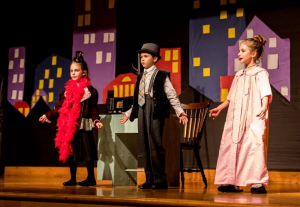
Drama clubs allow kids to step into the world of theater and unleash their creativity. Through acting, improvisation, and stage performances, children develop confidence, public speaking skills, and teamwork abilities. Drama activities promote self-expression and emotional intelligence as kids explore different characters and scenarios. They learn to work collaboratively, support their peers, and appreciate the importance of communication and body language. Drama clubs also offer opportunities for kids to showcase their talents through plays, skits, or talent shows, boosting their self-esteem and fostering a sense of accomplishment.
Related: 20 Best Things to Make With PlayDough for Kids
Coding Workshops:
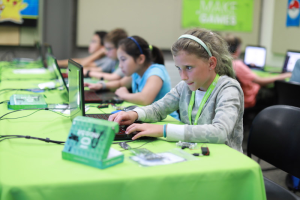
In today’s digital age, coding workshops have gained immense popularity as an after-school activity for kids. These workshops introduce children to computer programming and coding languages through interactive and hands-on activities. Learning to code enhances logical thinking, problem-solving skills, and creativity. It also nurtures computational thinking, which is essential for understanding complex systems and algorithms. Coding & technology activities provide kids with practical skills that are highly valued in today’s technology-driven world. They can create their own games, websites, or apps, giving them a sense of achievement and empowering them with valuable skills for the future.
Music Ensembles:
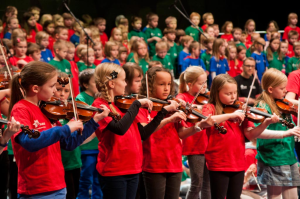
Joining a music ensemble, such as a band or orchestra, allows kids to develop their musical talents and appreciation for music. Playing an instrument as part of a group teaches teamwork, discipline, and synchronization. It also offers opportunities to perform in concerts or competitions, boosting confidence and showcasing their musical skills. Whether it’s playing the flute, trumpet, or violin, participating in music ensembles creates a harmonious and enriching after-school experience.
Book Clubs:
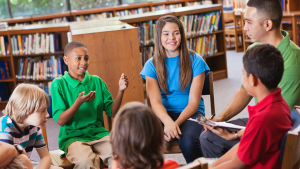
Book clubs provide a platform for kids to explore the joys of reading and engage in literary discussions. By reading and discussing books together, children enhance their reading comprehension, critical thinking, and communication skills. Book clubs also promote a love for literature, expand vocabulary, and expose kids to different genres and authors. It’s an intellectually stimulating after-school activity that encourages a lifelong love of reading and fosters a sense of community among young bookworms.
Robotics Competitions:

Engaging in robotics competitions introduces kids to the exciting world of robotics and engineering. They get hands-on experience in designing, building, and programming robots to accomplish specific tasks. Robotics competitions promote problem-solving, critical thinking, and teamwork as children collaborate with their peers to overcome challenges. These competitions also encourage creativity and innovation as kids find unique solutions to complex problems. Participating in robotics competitions offers a dynamic and technology-focused after-school activity that prepares kids for the future.
Environmental Clubs:
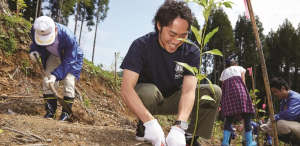
Environmental clubs are ideal for kids who are passionate about protecting the planet and making a positive impact on the environment. These clubs organize activities such as recycling initiatives, community clean-ups, and nature conservation projects. By participating in environmental clubs, children develop a sense of environmental responsibility, learn about sustainability, and gain a deeper understanding of the natural world. It’s a rewarding after-school activity that instills a sense of stewardship and empowers kids to become eco-conscious individuals.
Debate and Public Speaking:
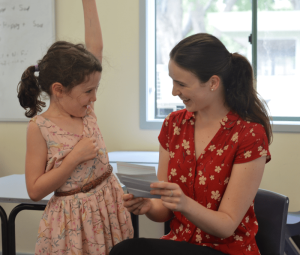
Debate clubs and public speaking programs nurture essential communication skills, critical thinking, and persuasive abilities in children. Engaging in debates and public speaking competitions helps kids articulate their thoughts effectively, listen attentively, and construct well-reasoned arguments. These activities build confidence, enhance presentation skills, and encourage open-mindedness and respect for diverse opinions. Debate and public speaking activities foster intellectual growth and empower kids to express their ideas with clarity and conviction.
Nature Exploration:
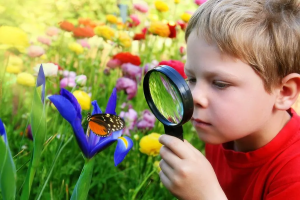
Nature exploration activities, such as hiking, nature walks, and outdoor expeditions, allow kids to connect with the natural world and learn about the environment firsthand. It provides an opportunity for them to appreciate the beauty of nature, develop an understanding of ecosystems, and foster a sense of environmental stewardship. Through guided explorations, kids can discover wildlife, identify plants, and learn about conservation efforts. Nature exploration activities promote physical fitness, curiosity, and a love for the outdoors, making it a fantastic after-school option.
Photography Clubs:

Photography clubs enable kids to express their creativity and develop their photography skills. Through workshops and outings, they can learn about composition, lighting, and storytelling through images. Photography encourages observation, attention to detail, and the ability to capture moments from unique perspectives. Kids can share their work, receive feedback, and learn from fellow photographers, fostering a supportive community. Whether it’s exploring nature, capturing portraits, or documenting events, photography clubs offer a creative and visually engaging after-school activity.
Chess and Strategy Games:

Chess and other strategy games are excellent options for kids to enhance critical thinking, problem-solving, and strategic planning skills. Joining a chess club or engaging in strategy game sessions helps children develop logic, concentration, and foresight. They learn to think several moves ahead, analyze different scenarios and make calculated decisions. Chess and strategy games also promote sportsmanship, resilience, and patience, as kids experience wins, and losses, and learn from each game. It’s a mentally stimulating after-school activity that challenges kids in a fun and competitive way.
Culinary Classes:

Culinary classes provide kids with the opportunity to learn cooking and baking skills in a supervised and educational setting. They can explore different recipes, ingredients, and cooking techniques. Culinary activities teach children about nutrition, food safety, and the joy of preparing meals from scratch. It enhances their creativity, promotes teamwork, and develops their fine motor skills. Plus, at the end of each class, kids can enjoy the fruits of their labor by tasting the delicious dishes they’ve prepared. Culinary classes offer a tasty and practical after-school activity for aspiring young chefs.
Yoga and Mindfulness:

Yoga and mindfulness sessions provide kids with a calming and relaxing after-school activity. These practices help improve physical fitness, flexibility, and balance while promoting emotional well-being and stress management. Through yoga, children learn breathing techniques, mindfulness exercises, and body awareness. It cultivates self-awareness, emotional regulation, and focus, which can positively impact their overall mental and physical health. Yoga and mindfulness activities create a peaceful and mindful environment where kids can unwind and find inner balance.
Community Theater:
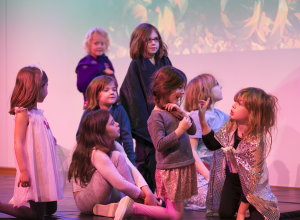
Community theater programs provide kids with opportunities to explore the performing arts and participate in theatrical productions. From acting and singing to set design and stage management, children can discover their talents and develop skills in a collaborative and creative environment. Community theater fosters self-expression, confidence, teamwork, and stage presence. It allows kids to showcase their talents and bring stories to life, creating unforgettable experiences and lasting memories.
Chess Clubs:
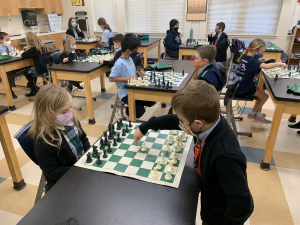
Chess clubs offer a supportive and engaging environment for kids to learn and improve their chess skills. Playing chess enhances critical thinking, problem-solving, and concentration. Kids can participate in friendly matches, tournaments, and chess puzzles, which help them develop strategic planning, decision-making, and analytical skills. Chess clubs also provide opportunities to meet and connect with fellow chess enthusiasts, fostering a sense of camaraderie and sportsmanship.
Volunteer Work:

Engaging in volunteer work exposes kids to the importance of giving back to the community and helping those in need. Whether it’s participating in food drives, assisting at animal shelters, or volunteering at local charities, children learn empathy, compassion, and the value of making a positive impact. Volunteer work promotes a sense of responsibility, gratitude, and social awareness. It also allows kids to develop interpersonal skills, teamwork, and leadership qualities as they collaborate with others toward a common goal.
Martial Arts:

Martial arts classes, such as karate, taekwondo, or judo, offer a structured and disciplined physical activity for kids. Martial arts training promotes self-discipline, respect, and self-confidence. Children learn fundamental techniques, improve their coordination and balance, and develop physical strength and agility. Martial arts also emphasize character development, teaching important values like perseverance, focus, and resilience. Participating in martial arts classes provides a well-rounded after-school activity that nurtures both physical and mental well-being.
Coding and Robotics Camps:
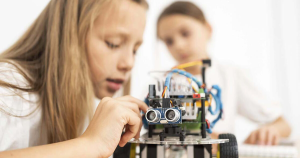
Coding and robotics camps offer immersive and hands-on experiences for kids to learn about computer programming, robotics, and technology. These camps provide structured lessons and interactive projects that introduce kids to coding languages, programming concepts, and the building of robots. Through coding and robotics, children develop logical thinking, problem-solving skills, and computational creativity. They can design and program robots to perform specific tasks, fostering innovation and fostering an interest in STEM fields.
